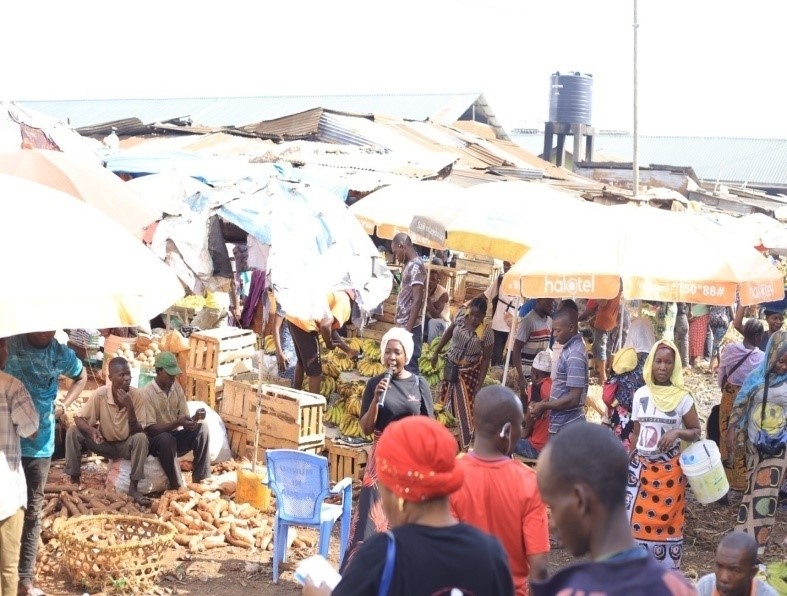The importance of addressing Gender Based Violence in the informal sector
Gender-based violence (GBV) inside marketplace is widely known in Tanzania; there is neither legal protection for women against harassment in the workplace nor political will to stop the violence against women who work in the markets. In spite of the personal risks, women, especially from low-income groups, manage to buy and sell goods.
Multiple forms of gender-based violence are prevalent, institutionalized, and normalized within informal marketplaces, affecting traders’ health, safety, security and economic well-being. GBV in the marketplace comes in several forms: verbal, physical and sexual. Equality for Growth Baseline Surveys conducted from 2015 to 2019 in three regions of Dar es Salaam, Shinyanga and Dodoma on GBV at market places revealed the following:
In Dar es Salaam, 96 % of women experience violence at their workplace. The leading violence is psychological/verbal (39.7%), followed by economic violence (32%), sexual violence (24.3%) and physical violence (4%). In Shinyanga, the leading violence is economic violence (34%) followed by psychological/verbal (31%), physical (28%), sexual (4%) and other violence (3%). In Dodoma (32%) of women experienced sexual assaults, verbal Abuse (31%), economic (21 %) physical (8%), psychological (6%) and other violence (2%).
Finland supports gender issues and the rights of women
Finland is supporting a Tanzanian Non-Governmental Organization Equality for Growth (EfG) to implement the Strategic Plan, which aims to strengthen the capacities of local authorities on handling GBV incidences and empower the women working in the informal sector to end GBV. Gender issues are an important part of Finland’s country programme for Tanzania and the rights of women are a key component of Finland’s overall foreign policy priorities.

Photo: Traditional dance group providing GBV awareness in markets in Dar es Salaam. EfG
The role of Equality for Growth in addressing GBV in the marketplace
EfG aims to help women to conduct business in an environment free from personal risks. EfG has been working to break down harmful social norms and practices to ensure women are respected and work in a safe environment. In addressing this EfG has been doing the following:
- Organizing and conducting anti-GBV campaign in markets
- Developing and adapting of anti-GBV guidelines in markets
- Training paralegals and legal community supporters on preventing and handling GBV in market places
- Distributing of publications, materials and resources
- Working with local leaders and the Children and Gender Desk police to address the issues
- Building capacity of market committee members, law enforcers and officials in addressing GBV
- Engaging with media to create awareness to the communities and inspire them to take action to end GBV in the marketplace
Guidelines to address GBV in the marketplace
There is no national guideline to address GBV in market places. EfG in collaboration with market committees, market leaders, municipal officials and police have developed guideline aiming to prevent and combat GBV at market places. A total of 22 markets have adopted and are actively using the guidelines. The guidelines have been effective in addressing GBV in the market places, over 1,500 GBV survivors have been assisted each year. In the near future, EfG will collaborate with the government through respective ministries to adopt the guideline to be used in all public spaces to end GBV.

Photo: GBV awareness in Temeke market Dar es Salaam. Efg 2011
The role of women in addressing GBV challenges in the market places
Women play a significant role in addressing gender-based violence in the markets. EfG has supported the development of community-based women groups and leaders in the forms of Legal Community Supporters in 4 regions of Mwanza, Mbeya, Shinyanga and Dar es Salaam. A total of 294 women Legal Community Supporters and Paralegals were recruited and trained to lead activities and awareness against GBV and support survivors of GBV in markets. Legal Community Supporters in the market have shown a greater help to market leaders in resolving various cases/complaints occurring in the market.
What has been achieved so far?
- 20,000+ market traders has been reached, increasing awareness of GBV and women’s rights
- GBV incidences have decreased from 96% to 15% from 2015 to 2020 in the project interventions areas
- 22 markets have adopted and are using the guideline for ending GBV
- The Government is interested to review and adopt EfG’s Guideline on GBV in the market place, incorporate their ideas and adopt it to scale up National Action Plan to end Violence against Women and Children (NAP-VAW) strategy. EfG is in consultation with the key person in the Ministry to find what process fits for them.
- The Government is open to engage with EfG to review the NPA-VAW strategy results indicators to be able to monitor and report on progress on addressing GBV in market places in Tanzania. EfG had some proposals around two thematic areas of the strategy that would strengthen monitoring of the economic pillar of the strategy. EfG is in consultation with the statisticians in the Ministry to influence the indicators.
Asna Mshana
Programme Coordinator, local cooperation fund

